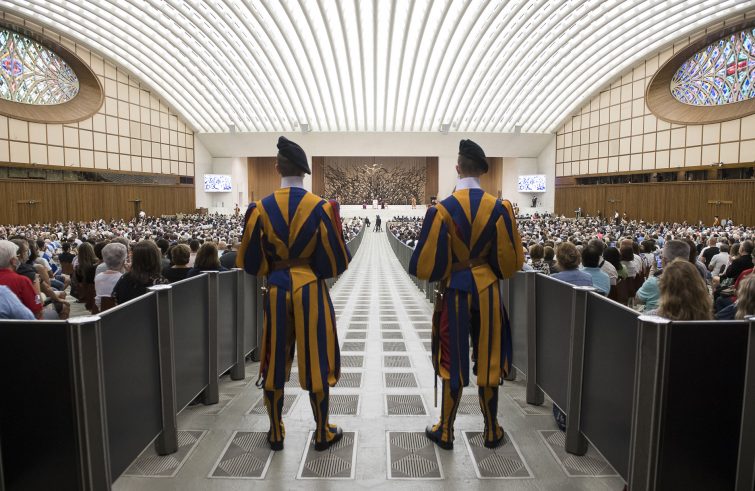
“The Christian is free, should be free.” But “many Christians take refuge in legalism, in sophistry”, Pope Francis said in unscripted remarks in the catechesis of Wednesday’s general audience in Paul VI Hall, dedicated to the theme of Christian freedom, “founded on two fundamental pillars: first, the grace of the Lord Jesus; second, the truth that Christ reveals to us and which is He himself.” “A proclamation that would preclude freedom in Christ would never be evangelical”, Francis said drawing on Saint Paul’s Letter to the Galatians: “You can never force in the name of Jesus; you cannot make anyone a slave in the name of Jesus who makes us free.” “Right there, where Jesus allowed himself to be nailed, God placed the source of the liberation of the human person.” “This never ceases to amaze us”, Francis pointed out: “that the place where we are stripped of every freedom, that is, death, might become the source of freedom. But this is the mystery of God’s love! It is not easily understood, but it is lived”, for “the truth of faith is not an abstract theory, but the reality of the living Christ, who touches the daily and overall meaning of personal life.”
“How many people there are who have never studied, who do not even know how to read and write, but who have understood Christ’s message well,
have this wisdom that makes them free”, Francis added in unscripted remarks:
“How many people do we find who live the life of Christ better than great theologians.”
“Freedom makes free to the extent to which it transforms a person’s life and directs it toward the good”, the Pope reminded the faithful, noting that “so as to be truly free, we not only need to know ourselves on the psychological level, but above all to practice truth in ourselves on a more profound level — and there, in our heart, open ourselves to the grace of Christ.”
“Truth must disturb us”,
Francis called on the faithful to “return to this extremely Christian word: restlessness. We know that there are Christians who are never restless: their lives are always the same, there is no movement in their hearts, they lack restlessness, a sign that the Holy Spirit is working inside us and freedom is an active freedom, that comes from the grace of the Holy Spirit. This is why I say that freedom must disturb us, it must constantly question us, so that we might always plunge deeper into what we really are. In this way we will discover that the journey of truth and freedom is an arduous one that lasts a lifetime.”
“Remaining free is arduous, but it is not impossible.
Freedom makes us free, makes us joyful, makes us happy.”
In the closing greetings to French-speaking faithful at the end of the catechesis, the Holy Father mentioned the Independent Commission’s report regarding sexual abuse in the Church in France, which was commissioned to evaluate the extent of the phenomenon of sexual aggression and violence committed against minors since 1950. “Unfortunately, a considerable number was revealed”, Francis remarked:
“To the victims I wish to express my sadness and my pain for the traumas they have endured and my shame, our shame, my shame that for so long the Church has been incapable of putting this at the centre of its concerns, assuring them of my prayers. I pray, and let us all pray together,”
Francis called on the faithful gathered he in Paul VI Hall: “To God the glory, to us the shame: this is a moment of shame!” “I encourage the French bishops and you, dear brothers who have come here to share this moment, I encourage the bishops and religious superiors to continue to do everything possible so that similar tragedies might not be repeated”, concluded the Pope, who expressed his “closeness and fatherly support to the priests in France in the face of this trial which is difficult but beneficial, and I invite the Catholics in France to assume their responsibility to guarantee that the Church might be a safe home for everyone.”











